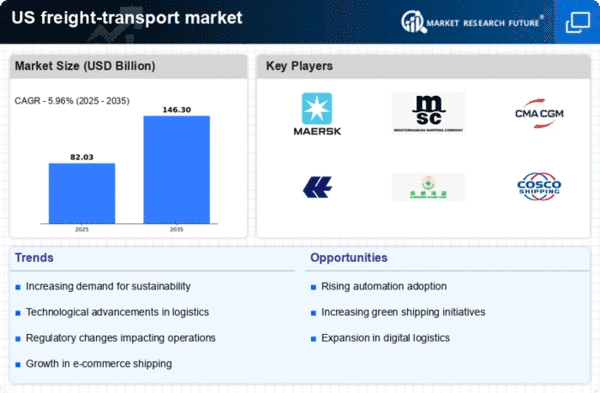Global Trade Dynamics
The maritime freight-transport market is heavily influenced by global trade dynamics. Changes in trade agreements, tariffs, and geopolitical tensions can significantly impact shipping routes and volumes. For instance, the recent trade agreements between the US and various countries may open new markets for exporters, thereby increasing demand for maritime transport services. Conversely, trade disputes could lead to reduced shipping volumes and increased costs. In 2025, the US is expected to see a 3% increase in containerized trade, driven by favorable trade conditions. This evolving landscape necessitates that shipping companies remain agile and responsive to changes in global trade policies to maintain their competitiveness in the maritime freight-transport market.
E-commerce and Consumer Demand
The rise of e-commerce has significantly transformed the maritime freight-transport market. As online shopping continues to grow, the demand for efficient shipping solutions has surged. In 2025, e-commerce sales in the US are projected to reach approximately $1 trillion, leading to increased freight volumes. This trend compels shipping companies to enhance their logistics capabilities, ensuring timely deliveries and efficient inventory management. Consequently, the maritime freight-transport market must adapt to accommodate the growing demand for containerized shipping, which is often preferred for its efficiency and reliability. The ability to meet consumer expectations for fast shipping could be a crucial determinant of success in this evolving market.
Regulatory Compliance and Standards
The maritime freight-transport market is increasingly influenced by regulatory compliance and standards set by governmental bodies. In the US, the implementation of stringent environmental regulations, such as the International Maritime Organization's (IMO) sulfur cap, necessitates that shipping companies invest in cleaner technologies. This shift is expected to drive up operational costs, potentially impacting freight rates. Moreover, compliance with safety standards, such as the U.S. Coast Guard regulations, ensures that vessels meet specific safety criteria, which can affect the overall efficiency of operations. As a result, companies that proactively adapt to these regulations may gain a competitive edge in the maritime freight-transport market, while those lagging behind could face penalties and operational disruptions.
Technological Integration and Automation
Technological integration and automation are reshaping the maritime freight-transport market. The adoption of advanced technologies, such as blockchain for supply chain transparency and AI for predictive analytics, is becoming increasingly prevalent. These innovations can enhance operational efficiency, reduce costs, and improve decision-making processes. In 2025, it is estimated that 30% of shipping companies in the US will implement automated systems for cargo tracking and management. This shift towards automation not only streamlines operations but also addresses labor shortages in the industry. As companies embrace these technologies, they may gain a competitive advantage, positioning themselves favorably within the maritime freight-transport market.
Infrastructure Development and Investment
Investment in port infrastructure is a critical driver for the maritime freight-transport market. The US government has recognized the need for modernizing ports to handle larger vessels and increased cargo volumes. Recent initiatives, such as the Infrastructure Investment and Jobs Act, allocate substantial funding for port upgrades and expansions. These enhancements are expected to improve operational efficiency, reduce turnaround times, and ultimately lower shipping costs. As ports become more capable of accommodating larger ships, the maritime freight-transport market may experience a shift in shipping patterns, with larger vessels becoming the norm. This evolution could lead to increased competition among shipping lines and potentially lower freight rates for consumers.
















